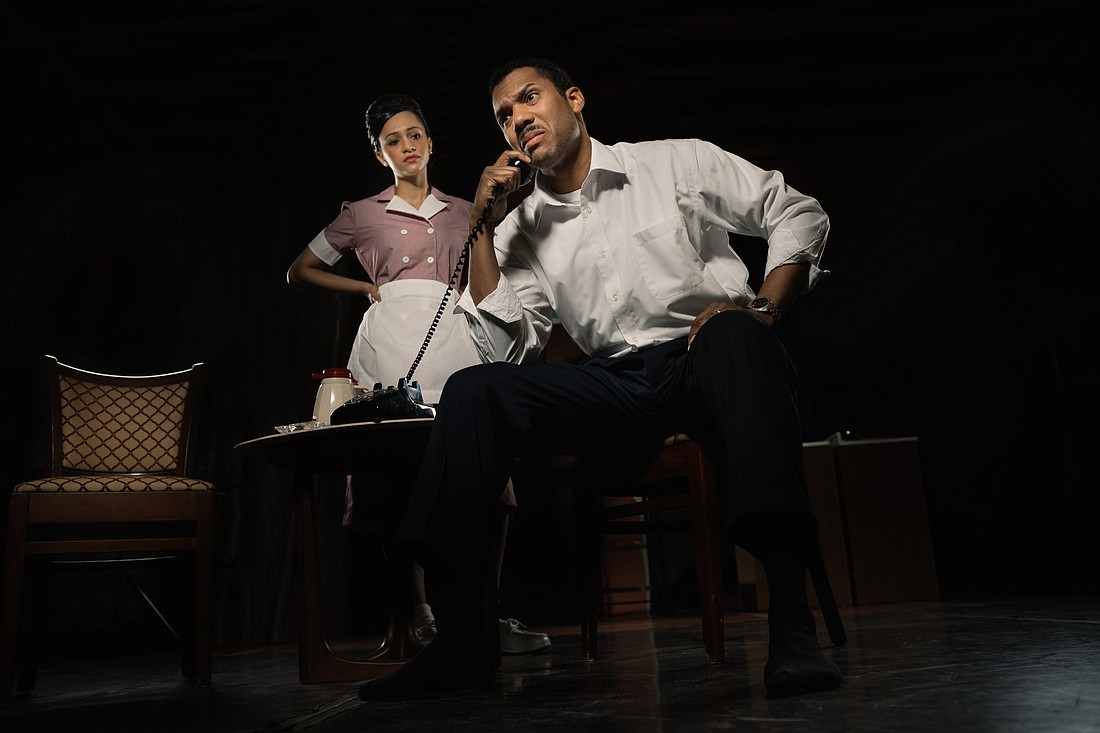- April 19, 2024
-
-
Loading

Loading

The Westcoast Black Theatre Troupe is climbing Katori Hall’s “The Mountaintop.” Her play is set on the night of April 3, 1968, aka the last night of Dr. Martin Luther King Jr.’s life. As the playwright imagines it, a dark night of the soul.
What actually happened? The bare facts are in the history books. King had flown into Memphis, Tenn. He was supporting the city’s striking sanitation workers, who were mostly black. Earlier that night, King had given his famous “Mountaintop” speech at the Mason Temple. He spoke of going to a mountaintop and seeing the Promised Land: a future of racial equality and social justice.
King’s vision spoke to the struggles of the ’60s, but it was rooted in the Bible. It referred to Deuteronomy 34:1-4—the passage where God showed Moses the Promised Land. Because of an act of hot-tempered disobedience, the prophet got a good look but couldn’t enter. The last thing Moses saw before he died.
For the Biblically literate, the implication was clear: King foresaw his own death. Initially, people assumed he referred to general threats. On April 4, the prophecy became chillingly specific.
In Hall’s play, King (Abdul-Khaliq Murtadha) returns from his prophetic speech to the Lorraine Motel — a Holiday Inn that’s seen better days. King has too. But he’s a driven man. He immediately starts working on his next speech, his next march, his next campaign. But he’s wiped out, and needs a jolt of caffeine. King calls for room service. An African-American maid named Camae (Emerald Rose Sullivan) brings him a cup of coffee. She’s pretty. King’s pretty interested. They flirt, share Pall Mall cigarettes, and trade volleys of light-hearted banter. Then the mood darkens.
King quickly suspects that Camae isn’t what she seems. She knows too much about him. (His real name, for example.) And she’s too improbably pretty. This might be a honey trap, a trick to obtain sexually compromising photos. Who’s behind it? Who sent her? Camae might be an undercover agent working for the FBI, or the operative of a Black Power group, or …
But that would be telling.
Without giving the game away, let’s just say Camae is not a garden-variety motel employee. But her identity isn’t the point; King’s identity is. The playwright put Camae in that motel room to reveal it. She breaks the news that King will die. (We won’t explain how she knows.) But now King definitely knows. This night becomes his time in the garden of Gethsemane: his hours of agony asking God to remove the cup of sacrifice.
Thanks to Camae, the play is a dialog, not a 90-minute soliloquy. This verbal sparring match reveals the content of King’s character. The struggle of his soul will move the hard-hearted to tears. King puts his life on the line—but he doesn’t want that life to end. At least not yet. Altruistically, King has work to do, and a family to nurture. In terms of mere self-interest, he doesn’t want to die.
That’s not in the cards. King’s prophecy came true at 6:01 p.m. the next evening. (Not early morning. U2’s “In the Name of Love” got the facts wrong.)
You know exactly what’s coming. But under Chuck Smith direction, the play still creates suspense. King’s life will end. But King’s soul is what’s at stake. That’s the point of his Socratic dialog with Camae. He’s wrestling with God. Smith’s rhythms make that clear in the flow of King’s thoughts from scene to scene.
Michael Newton-Brown’s set exudes banality. The prophets of old endured the wastelands of deserts; 20th century prophets had to put up with the lousy motel rooms. Outside, the night sky crackles with a gathering storm. The thunder sounds like a rifle shot—King flinches every time. Michael Pasquini’s sound and lighting perfectly sets the ominous mood.
Murtadha’s King is the private man. A glimpse of King when he’s off-stage and drops his guard. His King still radiates gravitas. But he can also be witty and charming—especially in the company of a pretty entity named Camae. He jokes, kids around, shares Pall Malls—every inch the notorious ladies’ man. Smith’s performance resonates with his portrayals of King in two recent Asolo Rep productions. This characterization doesn’t contradict the others. It’s a different side of King: another facet of a three-dimensional man. Sullivan’s Camae is young, gifted and black—a smart, hip representative of the younger generation who speaks the language of Black Power. In Sullivan’s portrayal, she’s sassy and self-assured; respectful, but not in awe. Her eyes flash with a knowledge King doesn’t share. Where King is earth, Camae is fire.
In the play’s alchemy, earth and fire combine to create revelation. Revelation is the name of the game. Hill isn’t interested in hagiography. Her version of King isn’t a sentimentalized plaster saint. He’s a man. A great man, yes. But all-too-human.
To remove any doubts on this subject, King relieves himself in the bathroom right after the play starts. That’s crossing a line, but making a point. The playwright will cross many more lines as her gutsy, poetic play unfolds. No airbrushing. No polite evasions. King’s at the gates of death, and his tears and fears are plain to see. Disrespectful? I don’t think so.
King, like all prophets, was flesh and blood.
His sacrifice means more because of it.